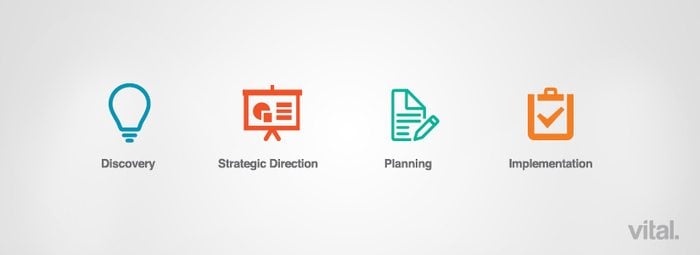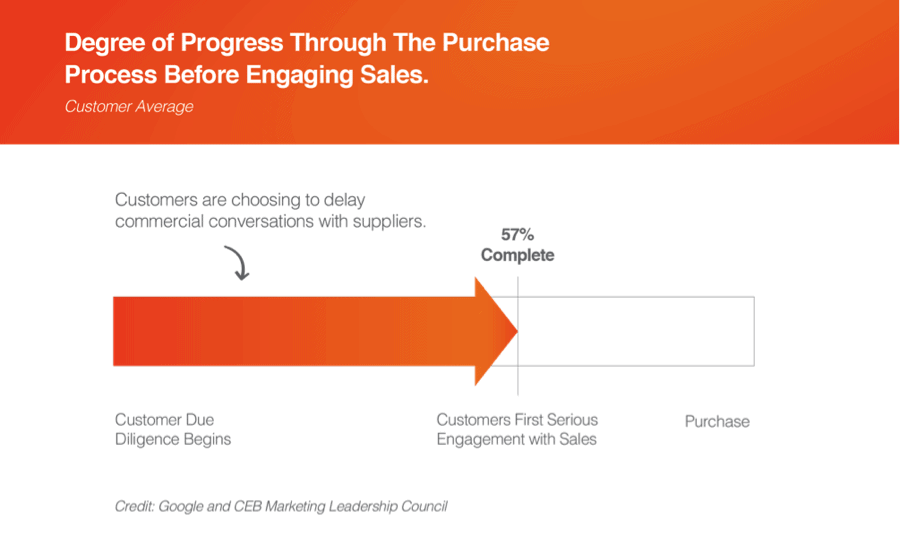In the world of content marketing, too many blog posts start off with phrases like, “In the world of…” You won’t find that here. We get right to the point.
This blog post is for the marketing director working for a B2B company — let’s call her Sally Henshaw. Sally is facing stiff competition, an evolving B2B marketing landscape and a boss demanding tangible results. Well Sally, never fear. This post is written just for you.
In general, people care about their own problems much more than they care about your company’s products or services. Sally knows this, and this is why she’s committed to implementing a content marketing strategy for her business—to speak to her potential customers’ pain points, and provide them with value.
As the marketing director of a B2B business, however, Sally faces a different set of challenges than most B2C companies. Since we are constantly, as consumers, being targeted by B2C marketing, it’s much easier for us to imagine marketing direct to consumers. Most content marketing strategy resources are also geared towards B2C marketing, so Sally is left trying to translate B2C content strategy advice into the B2B marketing world—and those strategies just don’t always carry over.
Previously, we’ve written about content strategy for “boring” industries, which is how many B2B companies think of their businesses, and Sally can use that post to come up with content ideas for her blog. The first step, however, is getting an overall content marketing strategy in place.
B2B Content Marketing Strategy
A core content marketing strategy is essentially the same for any kind of business. You go through a process of discovery, strategic direction, planning and implementation. You map out your buyer’s journey and identify your key buyer personas. You do research, get to know your audience, find out what their needs and concerns are and identify what unique value you have that you need to convey.
Let’s say Sally’s business manufactures printers that are sold through office supply stores. Let’s call her company Sheerox (get it, because Sally rocks—she rocks!). Sheerox’s marketing is going to look totally different from, say, an office supply store like Staples or Office Depot/Max (did they pick a name yet?), since Sheerox—the B2B—is selling to the stores (and likely a procurement team of the corporation that owns the stores), while the stores—the B2Cs—are selling to consumers.
71% of B2B marketers
use content marketing to generate leads.
-Marketing Profs
According to the Content Marketing Institute, 58% of B2B businesses expect to increase their content marketing budget in 2014—that number rises to 63% if only looking at the most effective content marketers. So if Sally isn’t already thinking about her business’ content marketing strategy, she runs the risk of falling behind the competition.
The Goal of all Content Marketing
To Educate the Customer
Marketing goals are typically formed around “brand awareness”—but today’s consumers (both individuals and businesses) make purchasing decisions differently than they did years ago. No longer does blanket brand recognition steer buying decisions; people want to know all about the types of products they’re shopping for, and feel like they’re making a very informed decision by the time they take their shopping cart (real or virtual) to check out. This means you aren’t trying to create an irrelevant advertisement just to grab attention and then squeeze your logo on it somewhere to get more recognition. You’re putting information out there that is not saying “buy my product!” but instead is saying, “I see where you’re at, what your pain points are, and here are several solutions and how they can help (oh, and I am also happy to sell you them—or just provide this valuable advice, and have a nice day).”
This type of educational focus in content marketing strategy is pretty standard across B2C and B2B content strategy, and it’s what consumers have come to expect.
So how does the implementation differ when it comes to B2B?
How B2B Content Marketing Strategy Is Different
The Buyer
A typical B2C buyer (the individual shopping at Staples) is only looking for one product—not much cost or risk to the transaction, and therefore not much research to buy. Selling to consumers like this is pretty easy—give them a sale to jump on or a reason to make an impulse decision on a cool new pen or keyboard protector and boom: purchase made.
Nearly 2/3 of B2B marketers
identified engaging key decision makers as their top challenge.
-Forrester Research
However, a B2B buyer (the purchasing manager for the regional branch of office supply stores) is more skeptical and more informed. They are coming to you with a list of preconceptions, pain points and needs. On the one hand, this can be seen as a challenge: your customer won’t be wooed by a clever tagline or convinced by a flash sale. You could, however, see this as a benefit to your content strategy—because every question your customer has, every argument they might make, every pain point they have, are all great opportunities for content. Mapping out these pain points in the buyer’s journey and identifying key buyer personas is much easier to do with a more educated buyer. Specific content execution comes later, but it’s also helpful to brainstorm some specific example ideas about what completed content might look like for each step in the buyer journey and for each buyer persona. This example post sketch will help Sally later on when she’s coming up with content ideas for each piece of the overall strategy.
How B2B Content Marketing Strategy Is Different
Longer Sales Process
A B2C sales process can be as short as a few minutes—from Googling a product, glancing at a few reviews, and completing the order, or just grabbing something at the cash register in line at the store. The customer may become a repeat customer, but there is nothing in between each separate purchase that is keeping them in a relationship. Each purchase is transactional, and the risk is minimal—at worst case scenario, they’ve lost the relatively small purchase price, or they can simply return the item with no loss at all.
A B2B sales process is much longer. The buyer comes to the table with knowledge, expecting you to provide even more information. If they do decide to make a purchase, it usually means the start of a long-term relationship. As a B2B marketer, Sally needs her content marketing to foster trust. If her customer chooses to invest in a product line that ends up costing their business money, his or her own job might be in peril—a much higher risk than purchasing an individual product.
A successful B2B content marketing strategy will educate the consumer in a way that alleviates those fears and builds brand trust. A great way to do this is to be clear in your content marketing about who your products and services are NOT for. This proves to the content consumer that you are not all about making a buck off of anyone, that you know your audience and will be forthright if your organization is not a good fit for a potential client. Demonstrating a good service reputation through testimonials is also an important element of content marketing.
For full breakdown of how B2B Marketing has evolved in recent years, check out a joint report published by Google and the Marketing Leadership Council.
Oh, and speaking of being forthright, if you haven’t already seen The Naked Brand, a film about the importance of transparency in marketing, at least go watch the trailer, and then come back. Go ahead, we’ll wait.
… *twiddling thumbs* …
You’re back! Compelling, right? “Being a great company is the new brand.” Bril. Okay, onward.
How B2B Content Marketing Strategy Is Different
Research
Adding to the already long sales process, B2B buyers spend countless hours online performing research on their future purchase, and they invest this research time upfront, prior to ever contacting sales. Many times, B2B products or services require a largely educational sell; whether you’re selling ERP software or laboratory autoclaves, the buyer will require that extensive due diligence be completed before making a decision. What’s more, while B2B buyers used to contact sales early on to begin their research, B2B customers now reported to being nearly 60% through the sales process before engaging a sales rep, regardless of price point. Now Sally, you’re an astute marketer—upon hearing this stat, you might note that another interpretation of this finding is that 57% of the sales process has disappeared. You are correct. It has disappeared and it’s been replaced by research your customers are doing on their own, without ever contacting you or your sales team.
While this disappearing sales process might seem concerning, it’s also an opportunity. You know your buyers are going to be doing research online, on your site and on your competitor’s websites. This is an opportunity to provide them with the research materials (white papers, case studies, ebooks, webinars and blog posts) they need to move forward in the sales process.
While the content marketing strategy is, obviously, owned by Sally’s marketing department, she knows that it needs to support and empower Sheerox’s sales team. Giving the sales team high-quality leads and everything they need to be able to close those leads bridges the divide between sales and marketing. Additionally, in order to be able to hone her marketing process, Sally can benefit greatly from the sales team’s data.
B2B content marketing isn’t pushing a consumer directly to a Cart or Buy Now option; it’s pushing a purchasing manager to talk to a sales person — either in person, over the phone, or via live chat. If that content hasn’t carefully educated, qualified, set expectations, procured relevant information and passed that along to the person who will be talking to them, you’re doing it wrong.
Example of a successful marketing-to-sales handoff:
The person has read several blog posts that establish how a great relationship with a company in your industry should work. They already know what you define a great client as, and how you define success. They’ve learned enough about the B2B businesses’ products or services — AND have been told enough about what that business is not, and who the products and services are not for— that they have self-identified as a good fit for you. You’ve also captured their business name and perhaps their type of need or greatest challenge in a form they filled out to download a piece of premium content that has given them even more value and empowered them to ask all the right questions of your sales team.
The handoff occurs when they fill out a contact form, essentially raising their hand to be contacted by a sales person. They may include a note about what they’re most interested in, and likely have put some thought into their message.
The sales team answers them back very quickly, having learned that leads that have come through this journey are high-quality leads and are people who really are serious about having a sales conversation. The customer gets a phone call that starts off something like, “I see you recently downloaded our eBook about [specific type of challenge or product], and are really concerned about [specific company concern]. We’re a great fit to help you solve this problem. Let’s talk more about it!”
At this point, the customer feels confident that they have been heard, and already trusts that they are in the hands of an organization that pays attention, listens and prioritizes communication and clarity. If your content marketing strategy is effective, once a potential customer has gotten this far in the process, you’ve already intentionally weeded out the ones who would waste your sales team’s time. You’ve also successfully handed off all relevant information to your sales team, to empower them to be successful at solving your customer’s problem.
By establishing a content marketing strategy that caters to a more informed and skeptical buyer, supports a longer sales process and empowers her B2B company’s sales team, Marketing Director Sally Henshaw is well on her way to rising above her competition. Not to mention impressing her boss with increased traffic, leads and, ultimately, sales.
Now that you better understand the strategy behind B2B content marketing, it’s time to give some real world examples of B2B companies who have successfully executed this very strategy.
- Consolidated Sterilizer Systems – A manufacturer of laboratory autoclaves, CSS provides autoclaves to laboratories universities, medical research and biotechnology facilities in more than 70 countries. In order to increase website traffic, CSS began regularly publishing blog articles and stepped up their social media presence. They then went on to create ebooks, whitepapers, and webinars for download to better help their customers make more informed buying decisions. Within seven months of implementing their inbound marketing strategy, the CSS website traffic increased 87% and website leads increased 177%. Read CSS’ full inbound marketing case study here.
- Plastic Printers – The folks at Plastic Printers produce unique business cards, gift cards and other plastic card products. In fact, they attribute their 24% year-over-year revenue increase to their ability to start the conversation with visitors earlier in the buying process using inbound marketing strategies. They did this by establishing a consistent blogging strategy and then creating better conversion opportunities throughout their website, such as offering free design templates for download. They also utilized marketing automation software and conducted multiple email marketing campaigns to distribute their blog content and continually drive traffic back to their website.
- Energy Cap – This utility bill management software company that helps other companies better manage their energy consumption. Energy Cap knows that their customers conduct a lot of preliminary research into their energy consumption management options prior to making a purchase decision. To take advantage of this opportunity they produced a high volume of quality eBooks, webinars, and blog posts to meet their prospective customers’ research needs.
- IRT Surveys — IRT provides rapid analysis of infrared images to discover and diagnose potential energy inefficiencies and property defects in order to help meet government regulations and maintain the value of buildings over time. To drive traffic, IRT started their Energy Efficiency Blog and began using marketing automation software to target specific market sectors with drip campaigns. They used sophisticated lead scoring to monitor their leads’ engagement levels and even triggered their sales team’s involvement based on the lead’s score. This helped to not only increase website traffic 2x, but also increase their number of sales-ready contacts 10x.
Made it this far, huh?
Well, as a reward for reading almost this entire post, we’re going to share a secret with you and reveal The Greatest Misconception in Content Marketing. Do yourself a favor and watch Rand Fishkin’s video below. Go ahead—we’ll wait.
You see, content marketing, especially B2B content marketing, takes time, discipline and fortitude. Most companies give up too early; they try content marketing, don’t see immediate results and they quit. Which is kind of a great thing, because it thins out the heard of competitors you have to compete with. If you’re like us, you’re hearing this and you’re getting really excited. Right, Sally? We believe in you. We know you have it in you to take on a content marketing strategy, stick with it and be successful. So go ahead, get out there and start today!
If you need some help implementing an effective B2B content marketing strategy, we’re here for you. Give us a shout—even if you just have a simple content strategy question, send us a tweet or drop us a line. We’re always happy to answer questions, and content marketing strategy is one of our favorite subjects!










